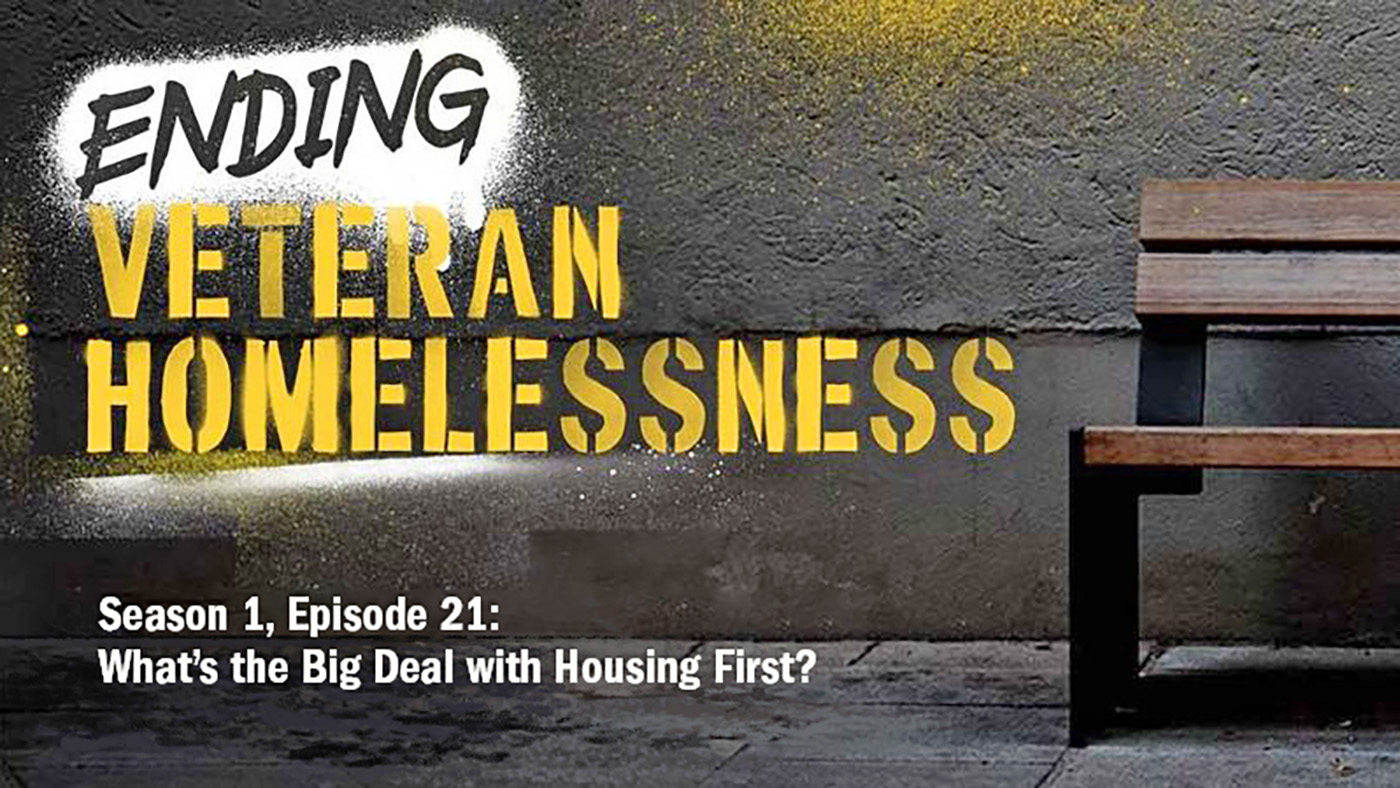When it comes to homelessness, for the last few years, the term Housing First has been a flashpoint for disagreement.
On January 2024’s episode of our Ending Veteran Homelessness podcast, we dove deep into what Housing First means at VA and why the term doesn’t need to divide us. Our guests are Dr. Keith Harris, homelessness agent for Greater Los Angeles, and Dr. Stefan Kertesz, a physician at Birmingham VA.
“It’s hard to talk in soundbites and tweets about complex topics like this, so everybody looks for something that’ll crystallize this disagreement. Here, we have Housing First. It’s literally just two simple words that say what it is. Everybody can grab onto that,” said Harris.
A wealth of experience
If anyone has the expertise to talk in-depth about using Housing First to end Veteran homelessness, it’s Harris and Kertesz.
A clinical psychologist by training, Harris now works in the Office of the VA Secretary, representing the secretary and other VA senior leadership in Los Angeles.
Kertesz is an internal medicine physician who began working in a health care for homeless Veterans program straight out of residency. He leads a Homeless Patient Aligned Care Team in Birmingham.
What is Housing First?
Since 2012, VA’s efforts to prevent and end Veteran homelessness have been built around a Housing First approach. This approach prioritizes getting Veterans into housing first and then assists them with access to health care and other supports that promote stability and improved quality of life.
At VA, we don’t try to determine who is “housing ready” or demand treatment prior to housing. Instead, treatment and other support services are wrapped around Veterans as they obtain and maintain permanent housing.
Initially, Housing First within VA was most closely associated with the Housing and Urban Development-VA Supportive Housing HUD-VASH program. It pairs HUD’s Housing Choice Vouchers, which help make rent affordable with VA’s clinical case management and health care services.
But VA has also found significant value in adopting Housing First as a systems-wide orientation to increase vulnerable Veterans’ access to temporary housing, such as emergency shelters or transitional housing, as well as other non-HUD-VASH permanent housing options.
And the results speak for themselves. Since 2010, Veteran homelessness has decreased by over 52% and 83 communities and three states have effectively ended homelessness.
Read more about how VA has implemented Housing First in VA homeless programs.
Exploring the nuances
Homelessness is a hot button topic across the country and it ranks as a top issue for voters in states like California. Both sides of the political spectrum recognize it as a problem, but many disagree about whether it’s the result of personal problems or systemic failures and how to fix it. Watch our video on risk factors for Veteran homelessness.
Harris and Kertesz cleared up a lot of the confusion surrounding Housing First, the biggest one being that Housing First is not housing only. From within a Housing First approach, Veterans can move into permanent housing without any mandates or requirements to treat any issues with substance use and mental illness. For some, not requiring treatment can feel like providers are leaving Veterans without proper support or, worse, that it can enable bad behaviors.
Approaching access to those services with empathy instead of authority is essential to the success of Housing First, said Kertesz. “Questions have to be asked respectfully with the same regard you would to anybody you cared about. Engagement is fundamentally about respect.”
At the center of VA’s Housing First approach is Veteran choice and dignity. VA honors Veterans’ autonomy and the decisions that shape their journeys of recovery.
Learn more about VA programs
- If you are a Veteran who is homeless or at risk for homelessness, call the National Call Center for Homeless Veterans at 877-4AID-VET (877-424-3838).
- Visit the VA Homeless Programs website to learn about housing initiatives and other programs for Veterans exiting homelessness.
- Check out the Ending Veteran Homelessness podcast to learn more about what VA is doing about Veteran homelessness.
- Dive in to One Team approach further by listening to this fireside chat with the Greater Los Angeles Health System.
- Learn how to get involved with housing homeless Veterans.
- Subscribe to the Homeless Programs Office newsletter to receive monthly updates about programs and supportive services for Veterans experiencing or at risk of homelessness.
Topics in this story
Link Disclaimer
This page includes links to other websites outside our control and jurisdiction. VA is not responsible for the privacy practices or the content of non-VA Web sites. We encourage you to review the privacy policy or terms and conditions of those sites to fully understand what information is collected and how it is used.
More Stories
Veteran Byron Potier weighed almost 300 pounds and was tired and lethargic. He was the perfect candidate for gastric sleeve surgery.
How much do you know about VA care, benefits and services? Don’t miss out on what you've earned—check out the "2025 VA Federal Benefits Guide for Veterans, Dependents, Survivors, and Caregivers" handbook to learn more.
Feeling stressed? Your breath can help you relax and focus. Take 3 minutes to reset and prioritize your well being for this week's #LiveWholeHealth practice.







Please call Mark Keller. Thank you have a great day and be